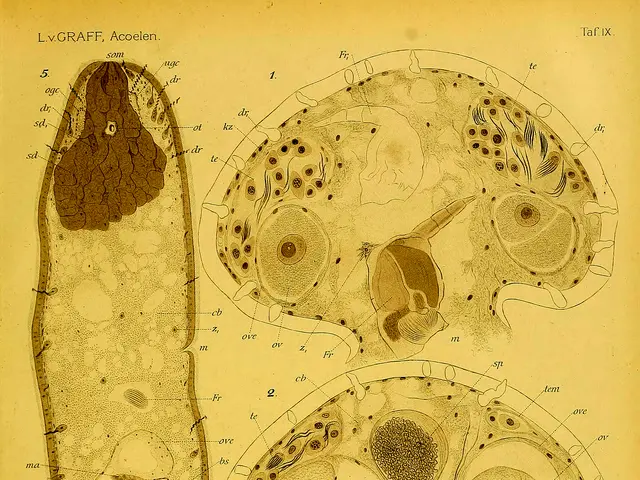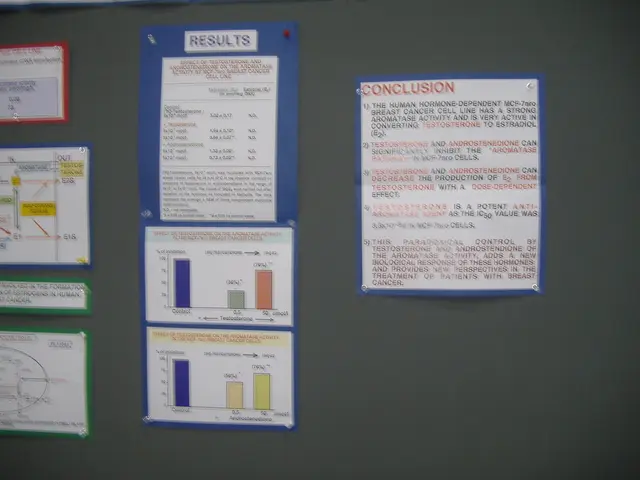Mood disorders in later life: A potential early warning sign for dementia
Late-Life Mood Disorders May Forecast onset of Alzheimer's Disease
Mental health issues that surface or reoccur in later life, commonly known as late-life mood disorders (LLMDs), could be more than just a cause for concern. They might be an early warning signal for dementia.
Research has shown a link between LLMDs and a heightened risk of dementia. But a new study published in Scientific Reports suggests that this connection goes far beyond just statistical coincidence.
Researchers found that people with LLMDs have increased levels of beta-amyloid and tau proteins in their brains compared to those with no late-onset mental health issues. These proteins are hallmarks of Alzheimer's disease and other neurodegenerative diseases.
"We often encounter cases in clinical practice where patients who develop mood disorders later in life - after the age of 40 - eventually progress to dementia," Keisuke Takahata, MD, PhD, the co-lead author of the study, told Medical News Today. "This has led to the shared clinical impression that such mood disorders may, in some cases, represent early symptoms of neurodegeneration."
The study ran a series of tests on 52 participants with LLMDs and 47 age-matched healthy controls. Participants with LLMDs showed approximately 50% tau accumulation and 29% amyloid deposits, compared to 15% and 2% respectively, in the control group.
According to Takahata, these abnormal protein levels can be detected years before traditional dementia symptoms first appear. Mood symptoms might, therefore, precede cognitive or motor symptoms by an average of 7.3 years, he explained.
"This finding highlights that mood symptoms can appear well before the clinical onset of dementia, sometimes by more than seven years," Takahata said. "It suggests that we should consider mood disorders - especially those with late onset - as possible prodromal features of neurodegenerative dementias. This perspective has important implications for earlier diagnosis and proactive monitoring of at-risk individuals."
The link between mood disorders and dementia
The link between depression and dementia has been well-documented in research. Untreated depression increases the risk for dementia, and patients with Alzheimer's disease and other forms of dementia exhibit a high rate of depression.
This new research by Takahata and his team is consistent with previous findings showing a link between amyloid and tau accumulation in the brain and LLMDs. Early detection and intervention have been proven essential in neurodegenerative diseases, as it's easier to protect a healthy brain than to attempt to repair neural damage once it becomes extensive.
The study by Takahata and his team has crucial implications for potential early intervention strategies. They plan to follow individuals with LLMDs over time, using longitudinal PET imaging to track the progression of pathological changes and their relationship to the emergence of cognitive or neurological symptoms.
Shifting focus: Treatment and prevention
"This isn't just about treating mood symptoms anymore - we're potentially intervening in the earliest stages of neurodegeneration," board-certified psychiatrist Richard A. Bermudes, MD, commented on the study. "The finding that 50% of late-life mood disorder patients showed tau pathology compared to only 15% of healthy controls means we've been underestimating the stakes."
Bermudes emphasized the importance of early detection and diagnosis, stating: "By the time we see obvious cognitive decline, we've lost years of intervention opportunity - but if depression or mania after age 40 signals underlying pathology seven-plus years before cognitive symptoms, we have an unprecedented therapeutic window."
The researchers hope their findings will encourage a shift in clinical practice to embrace comprehensive treatment approaches immediately. The evidence supports aggressive, multimodal interventions for late-life depression, and they have demonstrated safety and remarkable efficacy in older adults.
In conclusion, late-life mood disorders could serve as early biomarkers for neurodegenerative diseases like dementia. As opponents of mood symptoms might signal underlying pathology years before cognitive symptoms, acting quickly could offer a significant opportunity for early intervention and potentially shield the brain from further deterioration.
- Senior individuals experiencing late-life mood disorders, such as depression or bipolar, may be at an increased risk for developing dementia, including Alzheimer's disease.
- Research indicates a connection between late-life mood disorders (LLMDs) and the presence of beta-amyloid and tau proteins in the brain, which are associated with neurodegenerative diseases.
- One study, headed by Keisuke Takahata, found that people with LLMDs had up to 50% more tau accumulation and 29% more amyloid deposits in their brains compared to healthy controls.
- These abnormal protein levels, typically found years before traditional dementia symptoms appear, suggest that mood disorders could be a potential early warning sign for neurodegenerative dementias.
- Early detection and intervention have been proven crucial in treating neurodegenerative diseases, as it may allow for protection of a healthy brain rather than attempting to repair neural damage once it becomes extensive.
- Researchers like Takahata are now planning longitudinal studies to track the progression of pathological changes and their relationship to the emergence of cognitive or neurological symptoms in individuals with late-life mood disorders.








